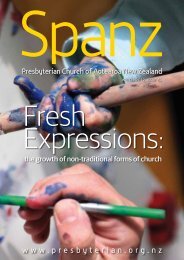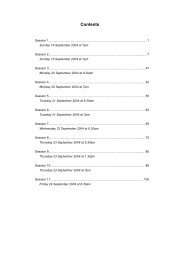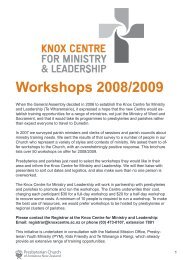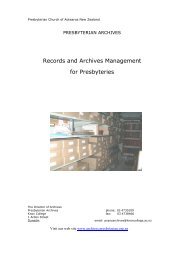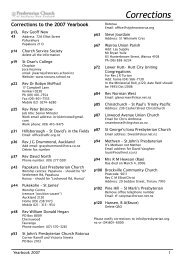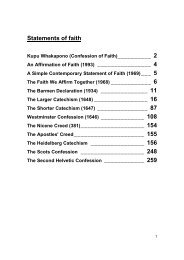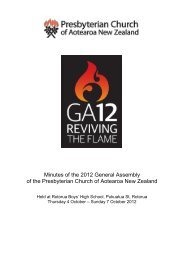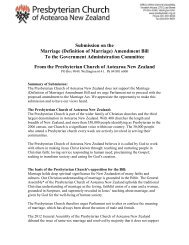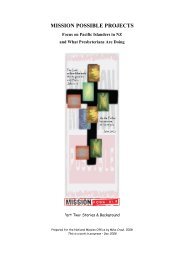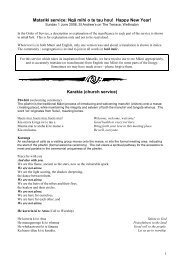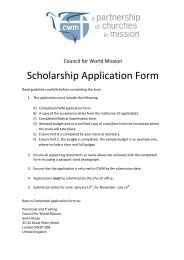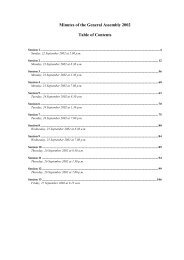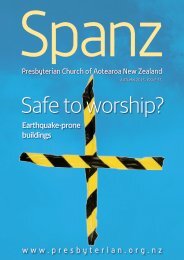Cultural diversity and unity in Christ: the Presbyterian Church of ...
Cultural diversity and unity in Christ: the Presbyterian Church of ...
Cultural diversity and unity in Christ: the Presbyterian Church of ...
You also want an ePaper? Increase the reach of your titles
YUMPU automatically turns print PDFs into web optimized ePapers that Google loves.
it: “The new fellowship transcends every limit imposed by family, class or culture. We are not<br />
w<strong>in</strong>n<strong>in</strong>g people like ourselves to ourselves but shar<strong>in</strong>g <strong>the</strong> good news that <strong>in</strong> <strong>Christ</strong> God has shattered<br />
<strong>the</strong> barriers that divide <strong>the</strong> human race <strong>and</strong> has created a new comm<strong>unity</strong>. The new people <strong>of</strong> God has<br />
no analogy; it is a ‘sociological impossibility’ that has become possible.” 63<br />
As this happens, though, <strong>the</strong> new comm<strong>unity</strong> be<strong>in</strong>g formed <strong>in</strong> <strong>Christ</strong> becomes as Lesslie Newbig<strong>in</strong><br />
called it a “sign, foretaste <strong>and</strong> <strong>in</strong>strument” <strong>of</strong> <strong>the</strong> reign <strong>of</strong> God. 64 As local congregations live out a way<br />
<strong>of</strong> life that is <strong>in</strong> contrast with <strong>the</strong> wider communities <strong>in</strong> which <strong>the</strong>y are located so <strong>the</strong>y become, to use<br />
ano<strong>the</strong>r phrase <strong>of</strong> Newbig<strong>in</strong>, <strong>the</strong> “hermeneutic <strong>of</strong> <strong>the</strong> gospel” 65 , <strong>in</strong>terpret<strong>in</strong>g to <strong>the</strong> world what God is<br />
on about, or as we noted 1 Peter put it “proclaim<strong>in</strong>g <strong>the</strong> mighty acts <strong>of</strong> him who called you”. There is<br />
a grow<strong>in</strong>g realisation among NT scholars that ra<strong>the</strong>r than <strong>the</strong> Roman Empire simply be<strong>in</strong>g <strong>the</strong><br />
political <strong>and</strong> cultural locale <strong>in</strong> which <strong>the</strong> early <strong>Christ</strong>ians lived <strong>and</strong> had little to do with how <strong>the</strong>y<br />
shaped <strong>the</strong>ir ideas <strong>and</strong> actions, an essential key to underst<strong>and</strong><strong>in</strong>g <strong>the</strong> NT is to see <strong>the</strong> <strong>Christ</strong>ian<br />
movement as a self conscious alternative to <strong>the</strong> empire, that <strong>of</strong>ten tyrannized <strong>the</strong>m. So if we see<br />
Ephesians <strong>in</strong> this light, pick<strong>in</strong>g up from where Paul f<strong>in</strong>ished <strong>in</strong> chapter 2 with a multiethnic,<br />
multicultural, multi-tongued family <strong>of</strong> God, it this new comm<strong>unity</strong> which <strong>in</strong> chapter 3 declares to<br />
Caesar that he doesn’t run th<strong>in</strong>gs any more, because <strong>in</strong> fact Jesus <strong>Christ</strong> is Lord <strong>and</strong> that <strong>in</strong> him he is<br />
ga<strong>the</strong>r<strong>in</strong>g all th<strong>in</strong>gs toge<strong>the</strong>r (1.10). Reflect<strong>in</strong>g on <strong>the</strong> implications <strong>of</strong> this N.T. Wright comments; “As<br />
long as we cont<strong>in</strong>ue to collude with th<strong>in</strong>gs that no Paul<strong>in</strong>ist should ever collude with – fragmentation,<br />
petty squabbles, divisions over this or that small po<strong>in</strong>t <strong>of</strong> doctr<strong>in</strong>e – <strong>the</strong> powers can fold <strong>the</strong>ir arms <strong>and</strong><br />
watch us hav<strong>in</strong>g our little fun while <strong>the</strong>y really run <strong>the</strong> show. But when <strong>the</strong>re actually is one body, one<br />
Spirit, one hope, one Lord, one faith, one baptism (Eph 4) <strong>the</strong>n <strong>the</strong> powers are called to account <strong>and</strong><br />
<strong>the</strong>y will know it. Someth<strong>in</strong>g new has happened.” 66 For Paul <strong>the</strong>n <strong>the</strong> church is that social <strong>and</strong><br />
political dimension <strong>of</strong> God’s reign that bears witness to <strong>Christ</strong>’s liberation <strong>of</strong> <strong>the</strong> cosmos from <strong>the</strong><br />
powers, which reorders humanity <strong>in</strong> such a way as to surmount ethnic <strong>and</strong> class differences.<br />
For reflection/discussion<br />
How relevant do you th<strong>in</strong>k this argument is for us <strong>in</strong> NZ today?<br />
A new vision<br />
Form<strong>in</strong>g communities like this <strong>in</strong> <strong>the</strong> k<strong>in</strong>d <strong>of</strong> society we have <strong>in</strong> NZ, as well as elsewhere, divided<br />
<strong>in</strong>to a vast array <strong>of</strong> fragments on all k<strong>in</strong>ds <strong>of</strong> grounds - ethnicity, culture, socioeconomic status,<br />
generations, lifestyle, gender – so that <strong>the</strong>re are <strong>in</strong> fact very few comprehensive communities that<br />
embrace all k<strong>in</strong>ds <strong>of</strong> people, may <strong>in</strong>deed be <strong>the</strong> most pr<strong>of</strong>ound witness to <strong>the</strong> gospel we can give <strong>and</strong><br />
is <strong>in</strong>deed a foretaste <strong>of</strong> what will be when God does <strong>in</strong> fact reign. As Bosch puts it “The church can<br />
only be missionary if its be<strong>in</strong>g-<strong>in</strong>-<strong>the</strong>-world is, at <strong>the</strong> same time, a be<strong>in</strong>g-different-from-<strong>the</strong>-world.” 67<br />
In similar ve<strong>in</strong> John Howard Yoder writes: “The political novelty that God br<strong>in</strong>gs <strong>in</strong>to <strong>the</strong> world is a<br />
comm<strong>unity</strong> <strong>of</strong> those… whose fellowship crosses l<strong>in</strong>es <strong>in</strong>stead <strong>of</strong> re<strong>in</strong>forc<strong>in</strong>g <strong>the</strong>m. This new <strong>Christ</strong>ian<br />
comm<strong>unity</strong> <strong>in</strong> which <strong>the</strong> walls are broken down… by <strong>the</strong> work <strong>of</strong> <strong>Christ</strong> is not only a vehicle <strong>of</strong> <strong>the</strong><br />
gospel or only a fruit <strong>of</strong> <strong>the</strong> gospel; it is <strong>the</strong> good news. It is not merely <strong>the</strong> agent <strong>of</strong> mission or <strong>the</strong><br />
constituency <strong>of</strong> a mission agency. This is <strong>the</strong> mission.” 68<br />
The book <strong>of</strong> Revelation images <strong>in</strong> that time that those who are ga<strong>the</strong>red toge<strong>the</strong>r before <strong>the</strong> Lamb are<br />
made up <strong>of</strong> a multitude <strong>of</strong> peoples “that no one could count from every nation, from all tribes <strong>and</strong><br />
peoples <strong>and</strong> languages” (Rev 7.9). The seer here seems to be us<strong>in</strong>g all <strong>of</strong> <strong>the</strong> terms at his disposal to<br />
emphasise that all human <strong>diversity</strong> is present, still apparently dist<strong>in</strong>guishable by <strong>the</strong>ir ethnicity,<br />
culture <strong>and</strong> language but never<strong>the</strong>less united toge<strong>the</strong>r <strong>in</strong> worship. Now <strong>of</strong> course that is an<br />
eschatological picture <strong>of</strong> what th<strong>in</strong>gs will be like when all th<strong>in</strong>gs are perfected <strong>in</strong> <strong>Christ</strong>, but liv<strong>in</strong>g <strong>in</strong><br />
63 David Bosch, Transform<strong>in</strong>g Mission (New York: Maryknoll, 1991) 389.<br />
64 Lesslie Newbig<strong>in</strong>, A Word <strong>in</strong> Season (Gr<strong>and</strong> Rapids: Eerdmans, 1996, 60-63.<br />
65 Lesslie Newbig<strong>in</strong>, The Gospel <strong>in</strong> a Pluralist Society (Gr<strong>and</strong> Rapids: Eerdmans, 1989) 223-233.<br />
66 Wright, “Whence <strong>and</strong> Whi<strong>the</strong>r”, 267.<br />
67 Bosch, Transform<strong>in</strong>g Mission, 387.<br />
68 John Howard Yoder, Essays Ecumenical <strong>and</strong> Ecclesiological (Scottdale: Herald Press, 1998) 91.<br />
17



